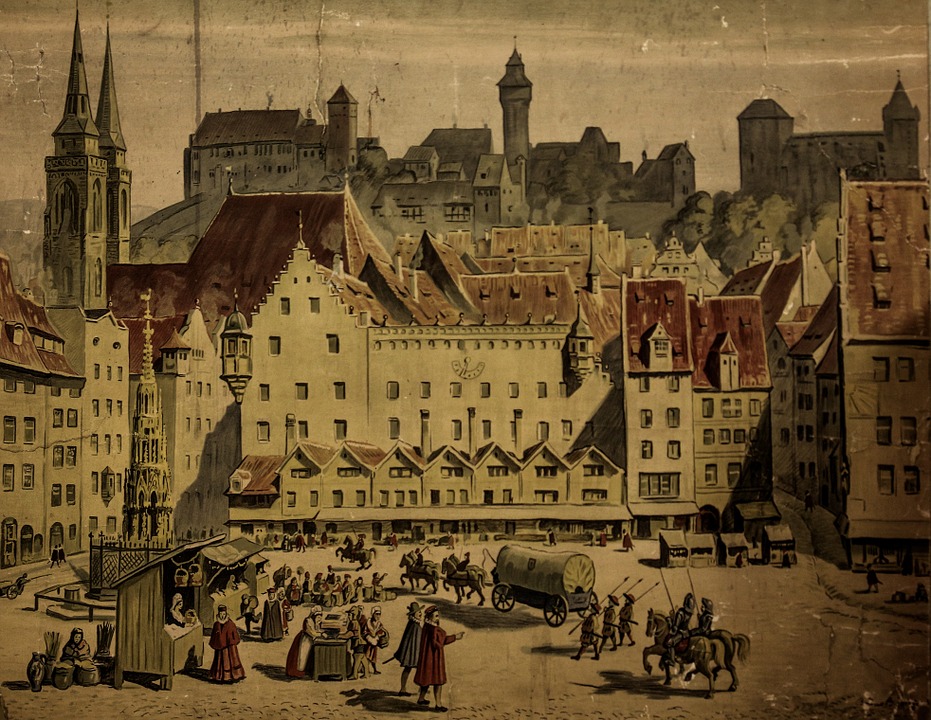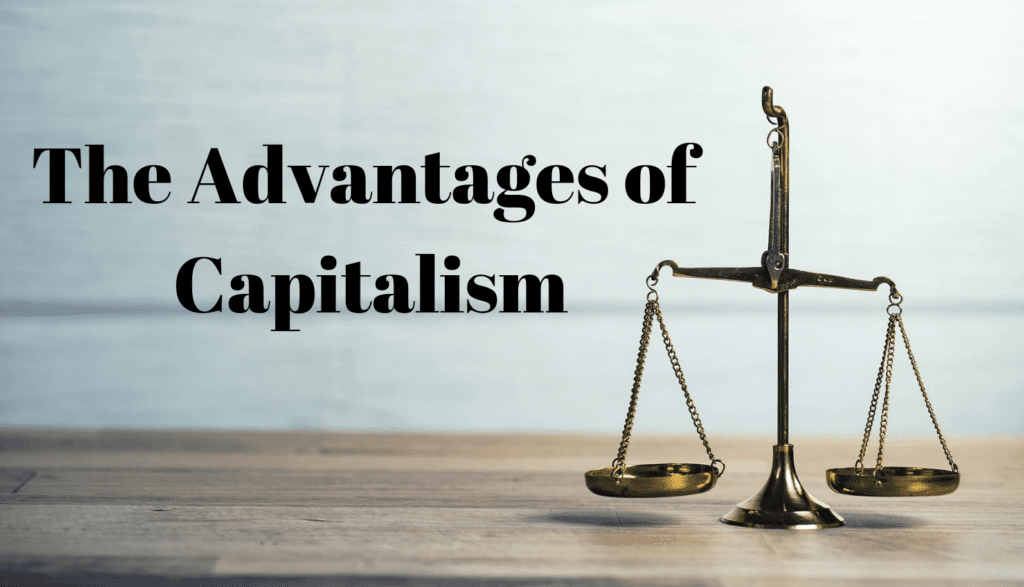What monitors and maintains the goods and services of businesses in your Country? Some may think that the production of products would be Government controlled. Some nations are, but Capitalism is a different type of economy.
Products consumed or bought by businesses are not under Government control in a Capitalist economy. Only a small few are regulated due to the Government acting in a secondary role.
Business owners make decisions about their products and properties with no Government interference. The medians of production are primarily privately owned.
Capitalism is an economic system. The productions of goods and services are privately owned and operated for a profit. Capitalism provides business owners and employees the freedom to manage their incomes.
The only Government involvement is taxation and standard regulatory laws. The Government has no stance on business operations. Nor can the Government object on how a company and its employees choose to spend their earnings.
Capitalism offers the most freedom for businesses than any other economic system. Different economies include socialism and communism, and they operate under Government control.
Capitalism is different. It is also referred to as “The Free Enterprise” or “The Free Market.” Private individuals and business owners have little to no Government interference.
Throughout history, every economy has seen its inclines and declines. Yet, Capitalism has continued to evolve throughout the centuries.
A Brief History on Capitalism
In the 18th Century, Capitalism made its introduction during the Industrial Revolution.
Known as the father of modern Capitalism, Adam Smith was a Scottish economist and a radical thinker. His theories developed much of the Capitalist economy. He fought for the free market, and his ideas remain relevant.
“No society can surely be flourishing and happy of which the far greater part of the members are poor and miserable.” quotes Jeremy Harwood in “Adam Smith,” 100 Great Thinkers.
Smith’s theory was that people should build on their capital freely. He felt as though it should be protected without fear of losing their profits or properties to the Government.
Nor did Smith approve of Governed business operations. He believed that it would only keep the poor impoverished. Instead, Capitalism would offer an opportunity for growth and equal prosperity for all.
Smith helped introduce the exchanging of goods and services with other countries. Capitalizing on assets and services that other Countries provided.
At the time, gold and silver classified as wealth. The economy boosted exports and resisted imports thinking this increased metal wealth. Smith had another idea.
For example, if grapes grow better in France than why attempt producing them in England? Smith encouraged importing and exporting from other Countries that would serve both nations.
He believed that wealth was derived from the goods and services that it created. Instead of restricting a nation’s capacity, he intended to set it free, known today as “gross national product.”
Smith supported economic freedom and to limit Government interactions with business owners. He wanted companies to feel secure to trade, save and invest without an overbearing authority. This Capitalist theory is what would make for a prosperous economy.
Indeed it did, and Capitalism became its own economic structure. Thanks to revolutionary thinkers like Adam Smith and for the Industrialized Revolution. Smith's legacy transformed the financial course for many nations, including the U.S.

What are the Five Characteristics of Capitalism?
Many factors construct Capitalism. Each necessary to ensure the continued success of this economy. The five characteristics of Capitalism include:
- Economic Freedom
- Voluntary Exchange
- Private Property Rights
- Profit Motive
- Competition
These characteristics keep Capitalism flourishing and prevent this economic structure from collapsing.
1. What is Economic Freedom?
Economic Freedom is imperative to the growth of Capitalism that allows the freedom to go beyond what people want. Financial freedom is the ability to choose careers, employers and job locations. Freeing people to change career paths without unnecessary Government obstacles.
Historically, traditional financial systems would have governed businesses through assigned leaders. Companies would obey leaders as opposed to what the business owner wanted. Similarly, Socialism enforces enterprises to work for the State.
Yet, Economic Freedom provides the opportunity for business owners to choose who they employ. Entrepreneurs decide what to sell, and what product they think will turn a profit. Economic Freedom enables businesses to reap rewards at their own risk.
In other words, Businesses can sell as many items as they want. They can charge a price they see fit and sell where they choose. There is no Government involvement, and Economic Freedom is only available under a Capitalist economy.
2. What is Voluntary Exchange?
Another crucial factor offered by Capitalism is the ability for voluntary exchange. In favor of both parties, a voluntary exchange enables buyers and sellers to market transactions. A buyer pays what a seller offers.
This type of business transaction is based on two things.
- A buyer invests in the worthiness of a product.
- A seller focuses on the profit worth rather than the product.
This process happens before products and services make it onto store shelves. This method between businesses and consumers is why the Capitalist economy has goods and services to buy. The end result is to satisfy the buyer, which then enables a seller to continue business transactions.
3. Private Property in Capitalism
Private property in Capitalism gives businesses who own their property the right to use it how they see fit. The only discrepancy is that the actions of property owners do not interfere with others. Giving private property rights for people to own and control their possessions.
Private property in Capitalism acts as motivation for people to invest, work and save. An incentive that has proven property owners to be less likely to harbor it.
Instead, owning private property inspires people to grow, lend or improve business properties. In America, the U.S. Constitution protects individual property rights for all Americans. Business owners can also use their properties as collateral when in need of a loan.
When compared to other financial systems, Capitalism makes owning private property simple. It allows investors to keep records and eases borrowing and investing.
4. What is a Profit Motive?
The profit motive allows people to increase their wealth. It permits businesses to invest as much as they want into a venture. Similar to gambling, if the investment fails, the stake is lost.
However, if the investment succeeds, the reward can be substantial. One must take the risk in a Capitalist economy to potentially reap the reward.
A profit motive is an incentive to increase wealth for people and their organizations. Through business operations, entrepreneurs become wealthier than when they began. Expanding the growth of a free enterprise system under a Capitalist economy.
For business owners profit growth drives production. The freedom of continual gains creates producers. So whether a new investor or not, producers offer the best products at the lowest price. A process that further incentivizes business investors.
5. Competition in Capitalism
There are no two ways about it; competition is a necessity in Capitalism. It thrives on it.
The nature of a Capitalist economy is to pit competing companies against one another. Competition pushes business owners to work harder when vying for the same consumer base. In a Capitalist economy, it is up to the efforts of the business on whether they will dive or survive.
The competition forces businesses to cater to their customers. Often companies offer specials, coupons, and discounts to entice their consumers to choose to buy from them. Unlike other economies, Capitalism allows business owners to heavily compete. The common theme with competition in Capitalism is that the consumer usually wins.
Capitalism provides results that assure adequate resources that benefit economic growth.
Competition benefits consumers by securing that unpopular products stop production. It pushes producers to generate newer, better, and less expensive products to market. A" survival of the fittest" for companies who offer the best quality products. This also rids of goods that no longer serve consumers.
A type of "supply and demand" that continues to structure the relationship between businesses and customers. Companies supply the demand of the consumer, the customer gets what they want, and business earnings rise. A win-win for both parties.
According to worldpopulationreview, the United States has the most notable economy in the world. Due to the U.S. Capitalism economy, foreigners move to America for their "pursuit of happiness." The United States is known as the "land of opportunity." Capitalism plays a significant role as to why people from away want to move there.
Expats from homelands that do not share the same economic structure see the potential Capitalism has to offer. Most are willing to uproot their families to render a more sought-after lifestyle.
Variety of Goods Offered in Capitalism
Capitalist economies offer a variety of goods and services that helps with individualism. Allowing consumers to choose their wants and needs based on their personal expressions. Capitalism provides customers a variety of options before they buy. These choices range in style, size, color, brands and more.
Consumers can see various products of the same make at a variety of stores. It provides customers with options that best suits their individual style. Preventing conformism that too, expands a business's profit margin.
The more successful an entrepreneur is, the wealthier the business. This provides companies the ability for expansion to create more stores. These chain stores enrich convenience for consumers and increase profit gains for businesses.
Capitalism empowers people to work harder to fund their dreams, knowing that their profits will be their own. This pushes people to be innovative and grow the economy.
Although some may see Capitalism as an economy only for the rich, this is untrue. Wealth under any economy serves the rich. Capitalism provides the opportunity of wealth for all.
Not everyone financially starts at the same place. But Capitalism offers equal opportunity and the potential to be more prosperous.

Capitalism Prepares People for Economic Change
The economy continually changes, and as humans, we love our routines. It provides comfort knowing what lies ahead and for many, change is preferred over time. Luckily, it is in our DNA to adapt, which works to our benefit since the market adjusts daily.
The market changes rapidly due to the price system. It acts like a chain reaction. If a price changes in one product it can have a domino effect on the prices in other industries.
A recent drastic change that has harmed businesses and consumers is the oil industry. Due to the lack of oil, oil prices have increased. This current affair negatively impacts the Automotive Industry.
In a Capitalist economy, entrepreneurs can make changes to goods and services to keep the interest of the consumer.
In this example, vehicle reconstructions needed to occur. Changes necessary to decrease wind drag and lighter weight materials to improve on gas mileage. The rising cost of oil on international markets affect economies. The Capitalist economy offers industries options for solutions to bounce back.
Capitalism gives businesses the ability to use creative tactics to counteract uncontrollable issues. Enabling innovation at its finest.
Individualism in Capitalism
Capitalism impacts “individual freedom," a luxury that may be taken for granted. Many economies worldwide are not provided the same liberties that a Capitalist economy provides.
Economic freedom allows businesses to grow and further economic growth under Capitalism ideology. It too encourages personal freedom. Providing people to make individualized choices and ultimately live “The American Dream.”
Capitalism provides people the ability to be expressive. As a Democracy, people can strive for a better life and seek a diversity of opportunities. Other economies do not grant their people this fortune.
Instead, economies monitored by Governments decrease or eliminate ownership for Entrepreneurs. Many disapprove of different economic ideologies outside of Capitalism. Due to Governments benefiting from business profits and controlling business operations.
Others dispute that Capitalism offers too much freedom aiding in the rich getting richer. Every race declares its winners and losers, and such, not all will succeed in patronage. With that said, every Entrepreneur can become accomplished on their own accord.
“The superior man understands what is right; the inferior man understands what will sell.”
In short, Capitalism benefits nations, businesses, and the economy. However, more importantly, a prosperous economy aids in generating better lives for people.
When an economy flourishes, so do the majority of its people. Not only is Capitalism structured to benefit business owners, but it also contributes to the success of employees.
Capitalism provides job opportunities and employment. Enriching lives of people occupying careers they want to pursue. Instead of settling for a mundane job that does not pay well. Employees can work multiple jobs or work in a field that provides for their families. Again, Capitalism providing individualized options.
In general, Capitalism has not always succeeded in history. However, as it has evolved, its failings have decreased. To much surprise, there has never been a country that has engulfed pure Capitalism. The closest was nineteenth-century America.
Today, Capitalist countries often have a mixed economy, a mixture of freedom and control. Not to be perceived that Capitalism does not or has never existed.
It merely means that Capitalism in its purest form has never been appropriated. Capitalism does exist in many countries and is still prominent even within America.
"Together, China and the EU generate 33.9 percent of the world's economic output of $127 trillion. The United States remained in third place, producing $19.4 trillion. The world's three largest economies combined produced $62.4 trillion. That's 49 percent of the world's total economy" - The Balance.
China, many European countries and the U.S are all considered Capitalist economies. Thus, producing profits that make up nearly half of the global economy.
Whether you agree with Capitalism or not, there is no disputing that its structure produces outstanding results. It is proving that its successes make up for any failings.
In theory, without Capitalism, many of us would never invest or inspire in business. Societies would be stagnant, and aspirations would seize to exist. Capitalism equips nations with the freedoms our ancestors wished to have accomplished.
Although Capitalism is not without its flaws, its imperfections do not supersede its successes. Businesses continue to grow, and people are still offered options.
Capitalism advances people in business to strive for wealth. Capitalizing on entrepreneurs and investors that profits them and not the Government. A type of economic freedom that empowers its people and that is ironically priceless.
Your Turn
Here at Capitalism.com, we're on a mission to make one million millionaires by 2028. We'd love YOU to be one of them!
The first step is finding your million-dollar business idea. Get started today by watching this free video that'll help you find the perfect business for you to build. Watch it here.









